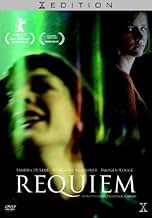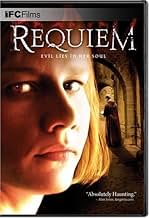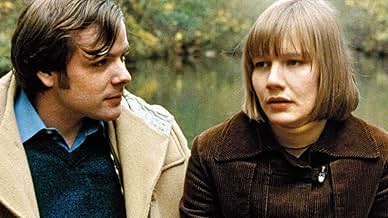IMDb रेटिंग
6.8/10
6.6 हज़ार
आपकी रेटिंग
अपनी भाषा में प्लॉट जोड़ेंA young woman with epilepsy suffers a breakdown during her first year at university, then decides to seek help from a priest in battling the troubles associated with her strict upbringing.A young woman with epilepsy suffers a breakdown during her first year at university, then decides to seek help from a priest in battling the troubles associated with her strict upbringing.A young woman with epilepsy suffers a breakdown during her first year at university, then decides to seek help from a priest in battling the troubles associated with her strict upbringing.
- पुरस्कार
- 16 जीत और कुल 19 नामांकन
फ़ीचर्ड समीक्षाएं
Phew this is hard to put into words.
At first I thought the cinematography was stunning, beautifully shot and the period was captured perfectly - I felt like I was watching a film shot in 1972 and it brought back early memories of the 70s.
The script was wonderfully subtle, there was absolutely no judgements about the characters. It would have been very easy to show the mother as a cruel an twisted woman but instead you could empathise with her, she thought she was doing the best for her daughter and that made the whole thing more tragic but also more real and beautiful.
To me the central message of the film was that life, however short is something to celebrate. The girl makes references to St Katarina who only lived a short time but did many wonderful things. She may not have escaped her strict and cruel mother for long but at least she did it and had a wonderful time for a while.
I kept having to tell myself they were actors. The depiction of the girl's first kiss at college was unlike any other I've seen. They captured the clumsiness and true feeling of the situation perfectly.
And finally the soundtrack - you'd think that deep purple wrote 'Anthem' for this film. Earlier we see her dancing ecstatically to the track when she's finally free at college and then we later see the relevance when it's used to play out at the end of the film.
I'm not sure I'll ever see a better film that this and I recommend it to anyone who occasionally likes to be moved by a movie.
At first I thought the cinematography was stunning, beautifully shot and the period was captured perfectly - I felt like I was watching a film shot in 1972 and it brought back early memories of the 70s.
The script was wonderfully subtle, there was absolutely no judgements about the characters. It would have been very easy to show the mother as a cruel an twisted woman but instead you could empathise with her, she thought she was doing the best for her daughter and that made the whole thing more tragic but also more real and beautiful.
To me the central message of the film was that life, however short is something to celebrate. The girl makes references to St Katarina who only lived a short time but did many wonderful things. She may not have escaped her strict and cruel mother for long but at least she did it and had a wonderful time for a while.
I kept having to tell myself they were actors. The depiction of the girl's first kiss at college was unlike any other I've seen. They captured the clumsiness and true feeling of the situation perfectly.
And finally the soundtrack - you'd think that deep purple wrote 'Anthem' for this film. Earlier we see her dancing ecstatically to the track when she's finally free at college and then we later see the relevance when it's used to play out at the end of the film.
I'm not sure I'll ever see a better film that this and I recommend it to anyone who occasionally likes to be moved by a movie.
Just saw the US premiere of the film at the Seattle International Film Festival. I have seen the American version of this story, but this is a far different film with a different goal.
While the US version concentrated on the more sensational parts of the story and the aftermath, this movie is much more interested in the drama of the situation and avoids the 'creeky door' effect of the US version. The filmmaker is very dispassionate about attempting to convince you one way or the other if it was a possession or a woman's psychological breakdown and I find that most appealing. (The US version also tried to ride the fence in a sense, but it was more obvious which "side" it picked as there were many horror movie moments, not present in this version.) The acting was universally GREAT and all actors were so very convincing in their roles. It will be interesting to see how American audiences that venture out to see this version accept it (It will NOT be the hit that "Emily Rose" was here as this will be considered an art film in America and I doubt will be widely released.) Look for it in the US and check it out!
While the US version concentrated on the more sensational parts of the story and the aftermath, this movie is much more interested in the drama of the situation and avoids the 'creeky door' effect of the US version. The filmmaker is very dispassionate about attempting to convince you one way or the other if it was a possession or a woman's psychological breakdown and I find that most appealing. (The US version also tried to ride the fence in a sense, but it was more obvious which "side" it picked as there were many horror movie moments, not present in this version.) The acting was universally GREAT and all actors were so very convincing in their roles. It will be interesting to see how American audiences that venture out to see this version accept it (It will NOT be the hit that "Emily Rose" was here as this will be considered an art film in America and I doubt will be widely released.) Look for it in the US and check it out!
Requiem works for many reasons--an intelligent script, understated direction, a somewhat verite camera style--but most of all it works because of Sandra Huller. For all of Michaela's exceptionalism, at no point could I doubt this character. As a recovering Catholic myself, I'm sensitive to the role religion, especially Catholicism, plays in people's lives; and Huller, in my opinion, creates the real thing: implicit faith that needs neither to advertise nor to apologize. Michaela's faith isn't about doctrine or rules but the meaning of life--more specifically, about living the meaning of one's own life, including its less attractive implications. Her faith makes her vulnerable to the devil (or, if you prefer, to her imagination that the devil is messing with her), but her faith also endows her growing suffering (and her eventual death, which she clearly foresees; note her reference to "martyrdom" in one of the last scenes) with an abundance of the same meaning that has sustained her life. She is peaceful at the end ("I must walk my path to the end.") That may be hard for a non-religious person to understand, but to someone raised on stories of the great saints, as Michaela was, it makes perfect sense. It is even something to be grateful for.
Requiem pulls off a bit of cinematic legerdemain in making Michaela a relatively open, non-fanatical, non-prudish woman in spite of the depth of her faith. Her real-life original, Anneliese Michel, wasn't much like that. She was a very conservative Catholic deeply opposed to the liberalization then occurring in the Catholic church after the Vatican Council. Her death and the subsequent trial of her parents and the exorcists forced a kind of confrontation, at least in Germany, between Catholic traditionalism, which has an entirely literal belief in spiritual realities and regards demonic possession and exorcism as established facts, and ecclesiastical modernism, which is embarrassed by such medieval notions and therefore preferred to take the position that Michel was "merely" mentally disturbed. (And if she were, did she suffer any the less? Was her faith any less meaningful to her?) Traditionalists regard Michel, her parents, and the exorcists as martyrs to a modernist church disloyal to its Christian past, and Michel's grave is today a pilgrimage site primarily for conservative Catholics. You'd never guess any of this from Requiem's very sympathetic treatment of her story.
Requiem pulls off a bit of cinematic legerdemain in making Michaela a relatively open, non-fanatical, non-prudish woman in spite of the depth of her faith. Her real-life original, Anneliese Michel, wasn't much like that. She was a very conservative Catholic deeply opposed to the liberalization then occurring in the Catholic church after the Vatican Council. Her death and the subsequent trial of her parents and the exorcists forced a kind of confrontation, at least in Germany, between Catholic traditionalism, which has an entirely literal belief in spiritual realities and regards demonic possession and exorcism as established facts, and ecclesiastical modernism, which is embarrassed by such medieval notions and therefore preferred to take the position that Michel was "merely" mentally disturbed. (And if she were, did she suffer any the less? Was her faith any less meaningful to her?) Traditionalists regard Michel, her parents, and the exorcists as martyrs to a modernist church disloyal to its Christian past, and Michel's grave is today a pilgrimage site primarily for conservative Catholics. You'd never guess any of this from Requiem's very sympathetic treatment of her story.
This movie doesn't have a clear message. Instead the title "requiem" really shows what this is about: looking at a person's life in every aspect of it. So the storytelling has to be much more from a distant viewpoint. Some may call this documentary-style as it seems to show a real social case study. Personally it reminded me a little bit of the early Scorseses style of movie-making (e.g. taxi driver): neutral viewpoint, but still subtle messages within, and finally the big clash in the ending, when all strings of the story developed throughout the movie come together.
For me, this is the best way of doing such a movie. First everything feels so normal as you watch the movie. In the end extreme situations begin to develop. Because you know the context, even it is a really extreme situation, it seems to be not at all inexplicable but very real, which it actually was. I could personally feel the helplessness with this situation, because I could not blame anybody in the movie, there was not a side who did anything wrong on purpose. All are just human beings, who are presented perfectly and believable through very good acting. The final shot of the girl's face with background organ music expresses many feelings I have about the movie.
All in all it is a very good movie, but of course it still does not feel as great as some of the best movies of the time. 9 stars
For me, this is the best way of doing such a movie. First everything feels so normal as you watch the movie. In the end extreme situations begin to develop. Because you know the context, even it is a really extreme situation, it seems to be not at all inexplicable but very real, which it actually was. I could personally feel the helplessness with this situation, because I could not blame anybody in the movie, there was not a side who did anything wrong on purpose. All are just human beings, who are presented perfectly and believable through very good acting. The final shot of the girl's face with background organ music expresses many feelings I have about the movie.
All in all it is a very good movie, but of course it still does not feel as great as some of the best movies of the time. 9 stars
Top notch performance by Sandra Huller, who thoroughly deserved the Silver Bear for the best actress in this film at the Berlin Film Festival. A very good film on epilepsy and mental illness, not possession by the evil spirits. Ms Huller has been consistently performing well in the films,such as "In the Aisles" and "Toni Erdmann."
क्या आपको पता है
- ट्रिवियाSandra Hüller's feature film debut.
- कनेक्शनFeatured in The Making of 'Requiem' (2006)
- साउंडट्रैकDown 'n' Out
Performed by Light of Darkness
Written by J. Latimer, B. Grant, M. Reoch and M. Bebert
Courtesy of MOP-Musikverlag Hans Sikorski KG
With kind permission of Second Battle Records
टॉप पसंद
रेटिंग देने के लिए साइन-इन करें और वैयक्तिकृत सुझावों के लिए वॉचलिस्ट करें
- How long is Requiem?Alexa द्वारा संचालित
- Who is St. Katharina?
विवरण
बॉक्स ऑफ़िस
- US और कनाडा में सकल
- $9,600
- US और कनाडा में पहले सप्ताह में कुल कमाई
- $3,309
- 22 अक्टू॰ 2006
- दुनिया भर में सकल
- $2,62,460
- चलने की अवधि1 घंटा 33 मिनट
- रंग
- ध्वनि मिश्रण
- पक्ष अनुपात
- 2.35 : 1
इस पेज में योगदान दें
किसी बदलाव का सुझाव दें या अनुपलब्ध कॉन्टेंट जोड़ें



























